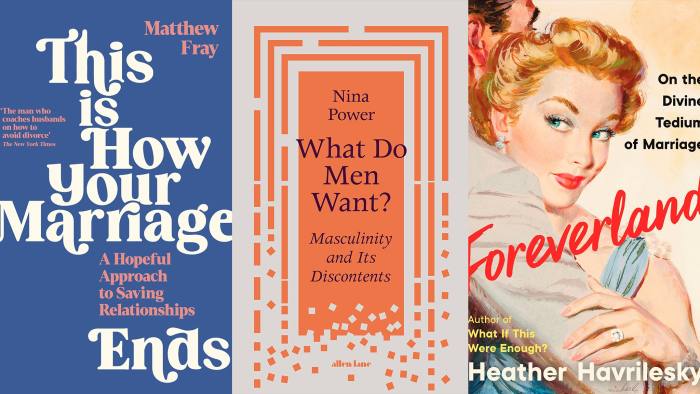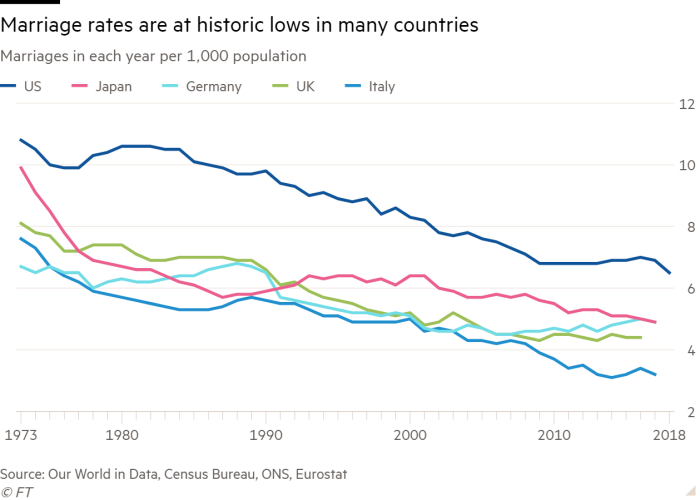Marriage in all its divine tedium

[ad_1]
My spouse and I are almost 11 years married, which implies we’ve reached the stage in our relationship the place buddies are beginning to get divorced. Because of my spouse’s loquaciousness together with her girlfriends, I’ve some sense of why these break-ups are occurring. The issue, most often, is identical: the wives are profoundly dissatisfied with their husbands. These aren’t dangerous husbands within the standard sense — they’re not philanderers or closet gamblers. Their flaws are extra low-key: they discuss an excessive amount of, and thus diminish their companions; disappear into spouse-excluding hobbies; fail to do their share of housekeeping. Briefly, they’re failing to make their wives fulfilled.
These husbands got here to my thoughts whereas I used to be studying That is How Your Marriage Ends. A self-help ebook by the American blogger-turned-marriage therapist Matthew Fray, it seems at a second when divorce is below the highlight in Britain, because of the introduction earlier this month of the “no fault” divorce legislation, eradicating the necessity for {couples} to assign blame in the event that they need to get divorced instantly. Fray’s start line is that when marriages collapse, somebody often is in charge — the husband. There’s some statistical foundation for this view: in each the US and the UK, round two-thirds of divorces are filed by wives, which does fairly recommend that males bear duty for the better portion of marital woe.
Fray studies that the majority wives depart their husbands not as a result of they’ve dedicated any “main marriage crimes”, however due to an accumulation of smaller offences, endlessly repeated. He is aware of whereof he speaks. His marriage lasted 9 years. He’s, he tells us, a well-meaning one that felt absolutely dedicated to his spouse. However he was nonetheless a “shitty husband”. His personal small crime — the one he repeated time and again — was to go away unwashed dishes and glasses on the counter. When challenged, he turned the tables on his spouse. Since he, personally, wasn’t offended by the sight of a stray glass, why ought to he modify his behaviour? If anybody was at fault, it was certainly her, for failing to “handle” her feelings correctly.
At present, Fray sees issues otherwise: the glass on the counter was essential just because it mattered to his spouse. His leaving it there despatched out a transparent message that her emotions have been beneath his consideration. Fray was failing in maybe a very powerful job of a life associate — recognising and validating the opposite individual’s experiences, even once they differ from yours. Minor as they appeared to him, his infractions ebbed away at his spouse’s religion of their union and destroyed their marriage. “We didn’t go down in a fiery explosion,” he writes. “We bled out from 10,000 paper cuts.”
Fray is just not a refined author. His frat-boy tone shortly turns into annoying — phrases like “douchebag” seem so much — and he makes his factors time and again. The truth is, the additional I acquired into That is How Your Marriage Ends, the extra I started to query his account of his spouse’s resolution to go away him. May it have had much less to do along with his slovenliness, and extra to do along with his tone of voice? But finally, the measure of a ebook like that is the usefulness of the recommendation it presents. And it’s laborious to quibble with Fray’s central message — that males may be taught to “suck much less” at marriage by changing into extra attentive to their companions’ emotions.
Featured titles

It’s a ebook that feels pertinent for one more purpose — the way in which it plugs into the dialog about masculinity going down throughout our tradition. Lately, there was a rising tendency to denigrate masculinity, with many seeing it as the basis reason behind a lot poisonous male behaviour, from rape and homicide to (comparatively) minor offences akin to “mansplaining”. On the opposite aspect of this debate are those that imagine that society has turn out to be unjustly illiberal of masculine values, with males more and more made to really feel that their very natures are below assault.
Fray occupies an attention-grabbing center floor. In some methods, he desires males to be extra manly, to higher carry out their conventional function of taking part in protector to their wives. However to be higher husbands, he desires males to sacrifice a few of their masculinity — by changing into extra fluent within the language of feelings. He desires to indicate males what they should be taught from girls, to be able to turn out to be higher variations of themselves.
Regardless of it being a really totally different ebook (and one in a roundabout way involved with marriage), one thing related is tried by Nina Energy in What Do Males Need?. Energy is a British thinker and essayist whose earlier ebook, One Dimensional Lady, explored how the alleged freedoms of consumerism usually serve to slim girls’s horizons. Her new one casts its stare upon males, taking goal at that “unforgiving pressure” of latest feminism that relentlessly focuses on males’s adverse traits. Whereas not denying that some males behave appallingly, Energy insists that the majority are literally fairly good — “type, considerate, self-aware, , compassionate”. She warns that if males are frequently lambasted for his or her shortcomings, extra will likely be pushed in the direction of excessive positions, additional worsening relations between the sexes.
In some ways, Energy is aiming to do on the cultural degree what Fray desires to do for particular person marriages. Her suggestion is that, by listening rigorously to 1 one other, women and men would possibly be taught to get alongside higher. Laudable as her targets are, they do lead her to undertake some positions on masculinity that struck me as excessively rosy. In a passage coping with “pick-up artists” — males who domesticate methods to dupe girls into having intercourse — Energy writes nearly gushingly about Neil Strauss, writer of The Recreation, considered the pick-up bible. Recalling as soon as seeing him give a chat, she describes him as “charming and witty in equal measure” and suggests he can be laborious to withstand in a nightclub.
She is equally overgenerous to the incel motion (a web based group of “involuntary celibate” males who imagine that girls are unfairly denying them intercourse). Glossing over its infamous misogyny, Energy describes it as a “group for outsiders” who exhibit the “deeply human want” of “desirous to be cherished”. Although incels have carried out numerous mass killings, Energy stresses that the “overwhelming majority” will not be actually murderers — as if an individual’s reasonableness will be deduced from the absence of a want to kill. In addition to coming throughout as naive, such particular pleading appears extraneous to her argument. It’s certainly potential to current a defensible model of masculinity with out pretending that males are nicer than they’re.
In Foreverland, the American essayist and recommendation columnist Heather Havrilesky engages with lots of the similar points, albeit in a really totally different type. Her ebook is a wedding memoir — a style that, for apparent causes, tends to be the protect of those that have fled the establishment. Havrilesky, nonetheless, is just not divorced: she and her husband, Invoice, an instructional, have been married for 16 years. In reporting from the entrance line of marriage — on what her subtitle describes as its “divine tedium” — Havrilesky due to this fact appears to be trying one thing without delay uncommon and fairly foolhardy.

And certainly, she doesn’t draw back from chronicling the much less nice elements of marriage. Her ebook appears designed to counter society’s insistence that there’s something cosy and romantic about two folks settling down collectively. Marriage, she informs us, “is a life-long market correction to real love’s overvaluation”. It’s a “slowly unfolding apocalypse”, one thing that “grinds your face into the filth”.
Nor are such brutal assessments confined to marriage itself. She writes witheringly about her husband, who fairly extremely gave the ebook his full backing. It portrays him as a person of “haunting deficits” who “lacks a frontal lobe”. He’s a “wretched, loud night breathing heap of meat”, or else “a heap of laundry: smelly, inert, ineffective, nearly sentient however not fairly”. She additionally reveals that she as soon as developed a crush on a “well-known writer”, and instructed Invoice that she fantasised about sleeping with him. (His nearly implausibly cheap response was to inform her that she mustn’t “apologise for imagining issues”.)
Havrilesky is risking one thing with all this — Invoice’s goodwill, definitely, but additionally a wider social approval. Marriages — and the sensation they encourage — are typically felt to be non-public issues, about which it’s incorrect to disclose an excessive amount of (gossiping with buddies is one factor; writing a ebook fairly one other). So it’s no shock that Havrilesky’s ebook has provoked a substantial backlash. When an extract was printed late final yr, she was accused of being “poisonous” and “twisted”, and numerous articles have appeared vilifying her as a lady who “hates her husband”.
The reality, in fact, is extra complicated. Havrilesky hates issues about Invoice, sure — however isn’t that true of any partner? Her mocking of him is clearly, partially, supposed for comedian impact. She can be clear that, with regards to the actually essential stuff, Invoice is the polar reverse of “shitty”. When, following the beginning of their first youngster, she exhibited emotions of intense worry and anxiousness, he responded with out the slightest trace of judgment and immediately modified his behaviour. Foreverland, in different phrases, is extra attention-grabbing than many are giving it credit score for. It’s a humorous, courageous and sometimes shifting try to seize marriage in all its complexity — the extremities of the feelings it conjures up, the elemental implausibility of the enterprise. It’s unlikely to enhance anybody’s marital behaviour, nevertheless it does current one thing near the unvarnished fact of marriage, stripped of the same old pretence and cliché.
And that’s a helpful factor, within the modern world, when marriage is below rising pressure. The cultural background depicted by Energy — one the place the sexes are at loggerheads — definitely doesn’t assist make it extra interesting. And there are many different issues chafing towards it: from the cult of self-fulfilment, which inspires folks to observe their goals, to the necessity for many households to have two full-time staff (hardly ever a recipe for home concord). Marriage, briefly, has come to appear fusty — an establishment rooted in an age when life was extra stratified and restricted. All of which makes it unsurprising that in each the UK and the US, marriage charges are at a historic low.
And but, the establishment does endure — and continues to be what most individuals choose as the essential construction of their grownup lives. There’s a way that marriage, for all its imperfections, stays one of the best path to fulfilment for a lot of — which is maybe why homosexual folks fought so fiercely for it. Marriage, then, is just not about to be ditched; which leaves us with the duty of constructing it work higher. The books below overview right here all go some method to serving to — by suggesting what people can do to avoid wasting their marriages, or what we will do as a society to speak about it extra in truth and turn out to be higher at forgiving one another.
This Is How Your Marriage Ends: A Hopeful Strategy to Saving Relationships by Matthew Fray, HarperOne $27.99/Memento Press £16.99, 304 pages
What Do Men Want: Masculinity and Its Discontents by Nina Energy, Allen Lane £18.99, 192 pages
Foreverland: On the Divine Tedium of Marriage by Heather Havrilesky, Ecco $27.99, 304 pages
Be a part of our on-line ebook group on Fb at FT Books Café
[ad_2]
Source link